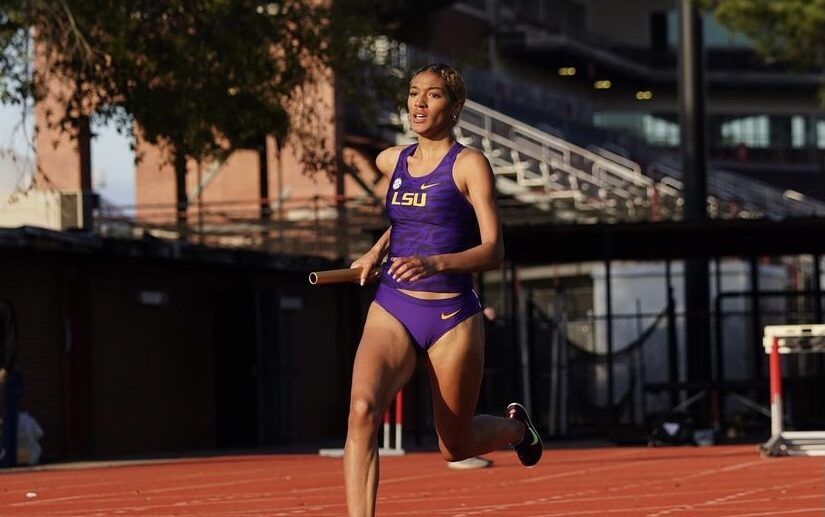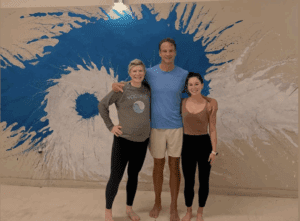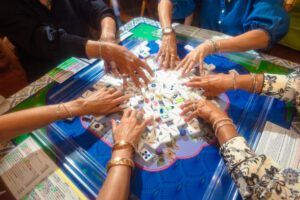An LSU runner talks student-athlete identity in the age of COVID
Editor’s note: The past year-and-a-half of social tensions, racial reckonings and other changes to modes of life continue to reverberate through public discourse—especially in university classrooms. So when LSU Manship School of Mass Communication professor Len Apcar asked students of his Spring 2021 feature-writing class to craft a piece about a first-person experience tied to the news, they jumped at the opportunity. Just in time for the Olympic Games’ opening in Tokyo this Friday, July 23, Katy-Ann McDonald—LSU track-and-field athlete and silver medalist at the SEC Championships in the 800-meter run—reported on the student-athlete experience in the era of COVID in the piece we share here, which she titled “More than an Athlete.”

When the COVID-19 pandemic turned the lights off in my world that revolved around track and field, it forced me to re-evaluate my identity. Who was I without sports?
The concept of identity has always made me to wonder. By definition, it is “the fact of being who or what a person or thing is.” But what exactly defines who I am? Is it my occupation or my character? My thoughts or my actions? My past or my future?
I assume it is a combination of factors that make up our individual identity. Many of us had parents who brought us up to be multifaceted, complex beings who are constantly growing.
So why, as college athletes, do we reduce our sense of self to our physical capabilities and lose touch with all other passions, talents, hobbies and activities we enjoy?
Growing up in England, my sport was time-consuming and required my endless devotion, but I never let it define me. I always kept a separate identity away from the track.
But when I moved to Baton Rouge to become a student-athlete, track and field became a full-time, high-pressure job. It took over my life and became my identity.
“My life has revolved around sport since before I can remember,” said Tyrese Johnson-Fisher who was born and raised in London and plays football at Copiah Lincoln Community College in Mississippi. “The difference between sport in the U.K. and in the U.S. is that it’s more widely accessible and highly celebrated here.”
“American Football has become my identity. It’s such a time-consuming sport that it has to define you, otherwise you won’t make it past college,” said Johnson-Fisher.
An NCAA Goals survey in 2020 reveals that the average college football player devotes 40 hours each week to their sport. This is already equivalent to the average American work week, without even considering the hours of classes and homework.
The pressure that comes with college sports far exceeds that of many jobs. There is pressure to fit the typical student-athlete mold. Then there is the pressure to please the coach, team, the media, fans, both on and off the track, pitch or field.
All of this combined makes it easy just to become what the world wants us to be, all while forgetting who we really are.
When I started my NCAA experience, I lost my identity. Without realizing it, I had reduced myself to the label of “athlete” and tricked myself into believing that is all I was. The system left me thinking that my physical capabilities and my success on the track defined who I was and the extent of my worth.
It is hard to develop yourself when only the physical side is being nurtured and given attention.
Anna Loughlan, born and raised in Cambridge, England is a member of the LSU women’s tennis team.
“I love my school and I love my sport,” Loughlan said. “But I can’t help but question my personal growth, outside of tennis,” she said.
“It was my dream to play professionally, up until the pandemic hit. It made me realize that I don’t want a career in tennis but I also haven’t given much thought to what else I can do after I graduate.”
Loughlan’s dilemma is not rare.
In the same NCAA study, 76% of Division I basketball players and 70% of football players think they have a “somewhat likely” chance of playing professionally after college.
In reality, fewer than 2% of student-athletes go on to do so.
This statistic is one that thousands of student-athletes need to embrace before it’s too late. It’s not enough to use their time in college as a means to an end, with a professional contract being the end goal.
“I know so many people who dropped out of college in their fourth year to try and go pro, but they didn’t get picked,” Loughlan. “Now they have no sport, no degree to fall back on, and barely even an identity anymore. It’s a shame.”
Out of all Division I student-athletes, 61% of women and 41% of men wish their coaches and athletic administrators talked more about careers after college.
Don’t get me wrong, the NCAA system is great, but it was created to support sporting development, not character development – we as student-athletes need to take care of the latter ourselves.
When the pandemic hit and my sport was taken from me, I started my journey of self-discovery. I reflected on how and why I was able to reduce myself to the “athlete” label and make my sport my identity.
Being a Division I athlete is enough to spark and maintain a conversation. It is an impressive achievement in a country that thrives on sports entertainment and celebrates sporting success.
I remember a conversation I had with a taxi driver on the first day of my freshman year. He seemed so amazed to be in the presence of a “track star,” as he referred to me throughout the trip.
Despite this being the first of many encounters like this, I never stopped questioning “why do so many people care that I run around fast in ovals?”
Looking back, I wish the taxi driver had asked me about my other goals, ambitions, hobbies or interests. Maybe then it wouldn’t have taken an entire pandemic to spark this reality check.
Next time you meet a student-athlete, show interest and ask questions about anything that is not their sport. They will be shocked and taken aback, but it will force them to think about a future that they may not have considered up until that moment.
So, who am I without sports? I still haven’t found a definite answer, but at least I’m looking for one.
Read all of the LSU student essays here.












